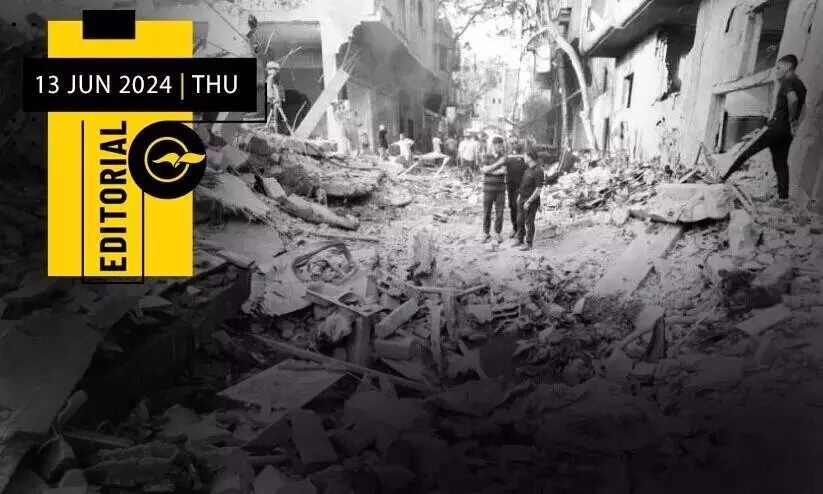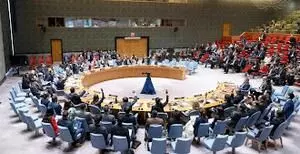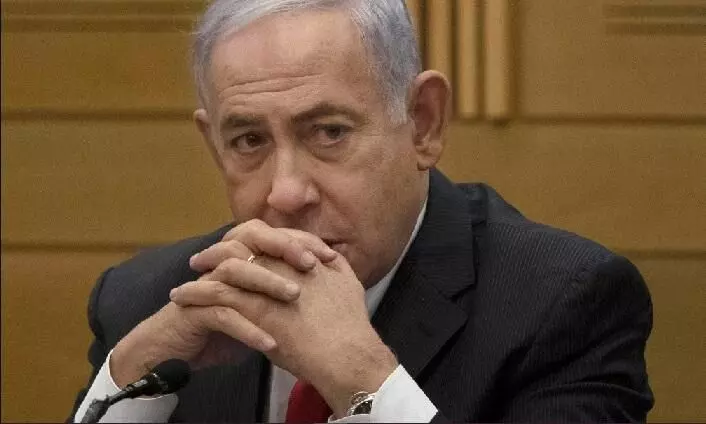
May peace prevail in West Asia
text_fieldsThe UN Security Council can be said to have finally paved the way to end the Israel-Hamas conflict that started on October 7 last year. It is a relief to hear that Israel and Hamas have accepted the cease-fire resolution containing the peace plan proposed by the United States on Monday. The resolution was approved with 14 of the 15 Security Council members voting in favour and Russia abstaining. Had Russia exercised its veto, the outcome would have been different. Since the United States had obtained Israel's concurrence even before it was presented, it means that the proposal has their consent. Hamas also had agreed after behind-the-scenes talks with Qatar and Egypt, the mediators. The eight-month-long war that has killed 37,164 people and injured 85,000 people on the Palestinian side, has left Gaza almost a wasteland, and displaced more than two million people, making them refugees in their homeland. So far around 1139 Israelis have been killed in the war of occupation. Prior to this, the resolution that came before the Security Council in March was vetoed by the United States, which acts only at the will of Israel. The resolution that has been passed now was put forward as a proposal by US President Joe Biden himself on May 31.
Secretary of State Anthony Blinken, who arrived in Israel a day before the resolution to secure support, spoke about the need to persuade Hamas. But then, these were almost the same suggestions put forward by Hamas through the joint peace efforts of Qatar-Egypt. The peace plan is proposed to be completed in three phases. The first phase of the six-week ceasefire would include the exchange of Israeli prisoners held by Hamas and Palestinian prisoners in Israel. Along with that, Israel must completely withdraw from the populated area of Gaza. Palestinian civilians should be able to enter anywhere in Gaza. If this does not happen within six weeks, the effort should continue until the conditions are fulfilled. In the first phase, humanitarian aid trucks will be allowed to enter Gaza at the rate of 600 per day. In the second phase, the hostilities should be completely stopped, all the prisoners in Gaza should be released and the Israeli army should completely withdraw from Gaza. In the third phase, a massive reconstruction project that will last for years should begin in Gaza. The remains of those killed in Gaza, if any, should be returned. Russia's side wanted to change Israel's policy that there would be a ceasefire only after the complete defeat of Hamas. However, Russia said it did not exercise its veto power because Arab countries supported it. Immediately after the resolution was passed, Hamas expressed its support on Monday itself. The Palestinian Islamic Jihad also endorsed the resolution. The UN resolution apparently offers hope for peace in West Asia for the time being.
The world wanted to see an end to the destruction, human slaughter and human tragedy that Israel has caused in Gaza following the rocket attack by Hamas on October 7th which came as a strong response after a long time of suffering the actions of Israel which unleashed bombings and cruel suppression in Gaza.
However, there are many concerns that arise with this. To date, Israel has had no history of honouring UN resolutions as a binding obligation. Moreover, history has shown similar disdain in Israel's defiance in terms of ceasefires, withdrawal from occupied lands, and adherence to international norms in the treatment of indigenous peoples. The resolution also reiterates the two-state solution through negotiations, as demanded by the Security Council. It also mentions the merging of the Gaza Strip and the West Bank under the Palestinian Authority. None of this has been agreed to by Israel. Apart from this, Israeli Prime Minister Benjamin Netanyahu is facing severe internal challenges. That is also what the resignation of War Cabinet member Benny Gantz suggests. He demanded that elections should be held soon. Netanyahu is struggling to reach a consensus between the far-right, who wants to keep Gaza under control, eliminate Hamas and establish a government there, and those who want an international body to maintain the rule. Netanyahu is trying to somehow prolong the war and prevent the cases involving the corruption allegations against him from going before the court. When that happens, the ball is back in Israel's court, as it always has been. The world is watching to see if they will act in the interest of world peace and if those responsible will step forward to force them to do so.


























